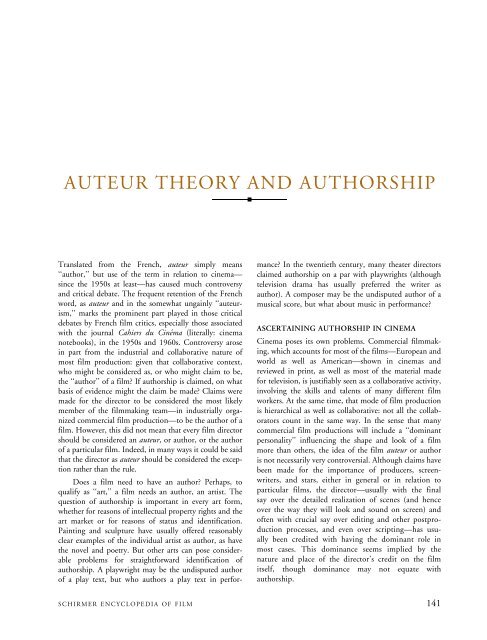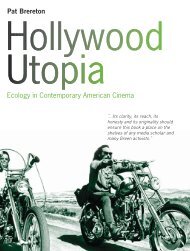Schirmer Encyclopedia of Film
Schirmer Encyclopedia of Film
Schirmer Encyclopedia of Film
You also want an ePaper? Increase the reach of your titles
YUMPU automatically turns print PDFs into web optimized ePapers that Google loves.
AUTEUR THEORY AND AUTHORSHIP<br />
Translated from the French, auteur simply means<br />
‘‘author,’’ but use <strong>of</strong> the term in relation to cinema—<br />
since the 1950s at least—has caused much controversy<br />
and critical debate. The frequent retention <strong>of</strong> the French<br />
word, as auteur and in the somewhat ungainly ‘‘auteurism,’’<br />
marks the prominent part played in those critical<br />
debates by French film critics, especially those associated<br />
with the journal Cahiers du Cinéma (literally: cinema<br />
notebooks), in the 1950s and 1960s. Controversy arose<br />
in part from the industrial and collaborative nature <strong>of</strong><br />
most film production: given that collaborative context,<br />
who might be considered as, or who might claim to be,<br />
the ‘‘author’’ <strong>of</strong> a film? If authorship is claimed, on what<br />
basis <strong>of</strong> evidence might the claim be made? Claims were<br />
made for the director to be considered the most likely<br />
member <strong>of</strong> the filmmaking team—in industrially organized<br />
commercial film production—to be the author <strong>of</strong> a<br />
film. However, this did not mean that every film director<br />
should be considered an auteur, or author, or the author<br />
<strong>of</strong> a particular film. Indeed, in many ways it could be said<br />
that the director as auteur should be considered the exception<br />
rather than the rule.<br />
Does a film need to have an author? Perhaps, to<br />
qualify as ‘‘art,’’ a film needs an author, an artist. The<br />
question <strong>of</strong> authorship is important in every art form,<br />
whether for reasons <strong>of</strong> intellectual property rights and the<br />
art market or for reasons <strong>of</strong> status and identification.<br />
Painting and sculpture have usually <strong>of</strong>fered reasonably<br />
clear examples <strong>of</strong> the individual artist as author, as have<br />
the novel and poetry. But other arts can pose considerable<br />
problems for straightforward identification <strong>of</strong><br />
authorship. A playwright may be the undisputed author<br />
<strong>of</strong> a play text, but who authors a play text in perfor-<br />
mance? In the twentieth century, many theater directors<br />
claimed authorship on a par with playwrights (although<br />
television drama has usually preferred the writer as<br />
author). A composer may be the undisputed author <strong>of</strong> a<br />
musical score, but what about music in performance?<br />
ASCERTAINING AUTHORSHIP IN CINEMA<br />
Cinema poses its own problems. Commercial filmmaking,<br />
which accounts for most <strong>of</strong> the films—European and<br />
world as well as American—shown in cinemas and<br />
reviewed in print, as well as most <strong>of</strong> the material made<br />
for television, is justifiably seen as a collaborative activity,<br />
involving the skills and talents <strong>of</strong> many different film<br />
workers. At the same time, that mode <strong>of</strong> film production<br />
is hierarchical as well as collaborative: not all the collaborators<br />
count in the same way. In the sense that many<br />
commercial film productions will include a ‘‘dominant<br />
personality’’ influencing the shape and look <strong>of</strong> a film<br />
more than others, the idea <strong>of</strong> the film auteur or author<br />
is not necessarily very controversial. Although claims have<br />
been made for the importance <strong>of</strong> producers, screenwriters,<br />
and stars, either in general or in relation to<br />
particular films, the director—usually with the final<br />
say over the detailed realization <strong>of</strong> scenes (and hence<br />
over the way they will look and sound on screen) and<br />
<strong>of</strong>ten with crucial say over editing and other postproduction<br />
processes, and even over scripting—has usually<br />
been credited with having the dominant role in<br />
most cases. This dominance seems implied by the<br />
nature and place <strong>of</strong> the director’s credit on the film<br />
itself, though dominance may not equate with<br />
authorship.<br />
SCHIRMER ENCYCLOPEDIA OF FILM 141
















